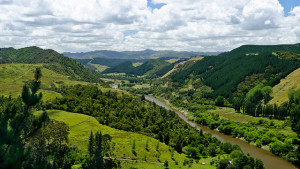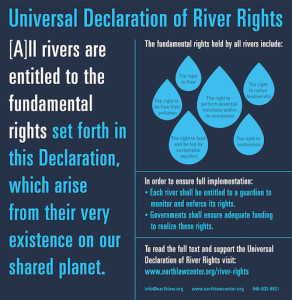Rights of Nature – The Planet’s Best Hope?
Jan 1st, 2018 | By admin | Category: Biodiversity/ConservationBy Suzanne York.
As the world rings in a new year, there are the ubiquitous feelings of desiring fresh starts and new beginnings.Yes, a fresh start is greatly needed, as the state of the global environment (and more) is extremely bleak.
With so much on the line for the planet as a whole – increasing climate change impacts, mass extinctions, ocean acidification, loss of arable land – we need not just more efforts to save the environment, and ourselves, but actual paradigm-changing endeavors.
Rights of nature is one way that offers hope for affecting real transformation. In a nutshell, it is viewing nature not as property and something to be exploited, but as a living, breathing entity.
Changing Our Direction
Respecting rights of nature offers a legal framework for lasting change. Recognizing rights of nature offers a framework for lasting change. While we certainly need to move toward clean energy, respect human rights, support sustainable livelihoods, to name a few ways of positive change, what is really needed is an inherent respect for nature. Without it, all of these well meaning efforts may not work, let alone last.
Leaders from the Rights of Nature movement released a report called Rights of Nature & Mother Earth: Rights-based Law for Systemic Change prior to the global climate negotiations this past November in Germany. In it, they make a statement that is the guiding force of real change, that is, “It is time to stop thinking we must protect nature and recognize that as much as every other life form on Earth, we are nature.” Too often, humans appear to think of themselves above nature, but in reality humans are part of the web of life.
This is the direction in which the world should head if we are to stand a chance at having a livable planet, and providing human happiness and well-being.
Measures on the rights of four rivers as rights-bearing entities have been passed in the past year, for revered rivers that are under stress from humans.
Sacred Rivers
In New Zealand, the nation’s parliament passed the Te Awa Tupua Act in April 2017, thereby giving the Whanganui River and ecosystem a legal standing in its own right. It guarantees the river’s “health and well-being” and makes it the first water system in the world to be recognized as a rights-bearing entity, with legal “personhood” status. It also recognizes that the indigenous Māori people have a special relationship with the river.
This recognition of the rights of the Whanganui River means that no matter who the actor, corporation or individual, the law now sees a harm to the river the same way as a harm to an indigenous tribe or person. (See the above-mentioned report for more background and analysis).
Earlier this year in India, a court ruled that the sacred Ganges and Yamuna rivers and their related ecosystems both have “the status of a legal person, with all corresponding rights, duties and liabilities … in order to preserve and conserve them.”
The pollution of both rivers is sadly legendary; for decades, people have worked to clean them up, to no avail, for a myriad of reasons. The rivers cannot perform the functions of thriving river ecosystems. Despite the best of intentions, environmental efforts continue to fail; the high court’s ruling could be a game-change for India’s holy rivers. The passage of a national Ganges Rights Act (National Ganga River Rights Act) is now under consideration by the Indian national government.
Mexico, too, is close to establishing river rights, with a recent vote to pass the Water Sustainability Law of Mexico City. As reported by Earth Law Center, which has worked on a universal declaration of river rights, “A key provision of this landmark law recognizes the rights of rivers, channels and streams — including a right to flow, a right to avoid harmful alternations to ecosystems and biodiversity, a right to be free from contamination, and a right to rescue and rehabilitate important water zones.”
Making Nature’s Rights Mainstream
Given the state of the planet, 2018 needs to be the year that rights of nature becomes a mainstream concept. Is this a little ambitious for such a radical shift in thinking? Yes, but clearly a change of direction is needed. The above examples show that change is happening. We just need more of it, starting now.
Suzanne York is Director of Transition Earth

![[photo: pixabay.com]](http://populationgrowth.org/wp-content/uploads/2018/01/pexels-photo-531872-300x169.jpeg)

